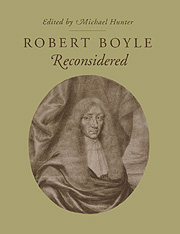Book contents
- Frontmatter
- Contents
- List of contributors
- List of abbreviations
- Preface
- 1 Introduction
- 2 Virtue, providence and political neutralism: Boyle and Interregnum politics
- 3 Science writing and writing science: Boyle and rhetorical theory
- 4 Learning from experience: Boyle's construction of an experimental philosophy
- 5 Carneades and the chemists: a study of The Sceptical Chymist and its impact on seventeenth-century chemistry
- 6 Boyle's alchemical pursuits
- 7 Boyle's debt to corpuscular alchemy
- 8 Boyle and cosmical qualities
- 9 The theological context of Boyle's Things above Reason
- 10 ‘Parcere nominibus’: Boyle, Hooke and the rhetorical interpretation of Descartes
- 11 Teleological reasoning in Boyle's Disquisition about Final Causes
- 12 Locke and Boyle on miracles and God's existence
- Bibliography of writings on Boyle published since 1940
- Index
4 - Learning from experience: Boyle's construction of an experimental philosophy
Published online by Cambridge University Press: 03 December 2009
- Frontmatter
- Contents
- List of contributors
- List of abbreviations
- Preface
- 1 Introduction
- 2 Virtue, providence and political neutralism: Boyle and Interregnum politics
- 3 Science writing and writing science: Boyle and rhetorical theory
- 4 Learning from experience: Boyle's construction of an experimental philosophy
- 5 Carneades and the chemists: a study of The Sceptical Chymist and its impact on seventeenth-century chemistry
- 6 Boyle's alchemical pursuits
- 7 Boyle's debt to corpuscular alchemy
- 8 Boyle and cosmical qualities
- 9 The theological context of Boyle's Things above Reason
- 10 ‘Parcere nominibus’: Boyle, Hooke and the rhetorical interpretation of Descartes
- 11 Teleological reasoning in Boyle's Disquisition about Final Causes
- 12 Locke and Boyle on miracles and God's existence
- Bibliography of writings on Boyle published since 1940
- Index
Summary
In the ‘Introductory Preface’ to an otherwise lost work which Boyle apparently wrote in the early 1650s, he claimed that ‘ever since I first addicted my Time and Thoughts to the more serious parts of Learning [I] found my selfe by a secret but strong Propensity, inclined to the Study of Naturall Philosophy’. This evidently occurred before the three-year tour of the continent that he undertook under the tutelage of Isaac Marcombes from 1639 onwards, since he states that, prior to ‘the commands of my Parents engaging me to visit divers forreigne Countrys’, ‘the first course I tooke to satisfy my Curiosity, was to instruct my selfe in the Aristotelian Doctrine, as that whose Principles I found generally acquiesced in by the Universitys and Schools, and by numbers of celebrated Writers, celebrated for little lesse, then Oraculous’.
According to Boyle, it was while he was on the continent that he was first ‘strongly tempted to doubt’ the ‘solidity’ of Aristotelianism, because he ‘met with many things’ both in reading and in observation, that were ‘capable to make me distrust the Doctrine’. In time, he formulated three general objections to it. First, he found that Aristotle's principles had not been ‘proved by his admirers’ but had been convincingly ‘opposed not only by the Chymists in generall and great store of Moderne Physitians, but [by many] acute and famed Philosop[hers]’.
- Type
- Chapter
- Information
- Robert Boyle Reconsidered , pp. 57 - 78Publisher: Cambridge University PressPrint publication year: 1994
- 10
- Cited by

